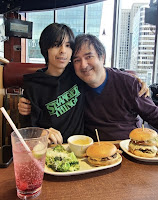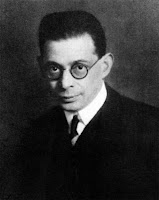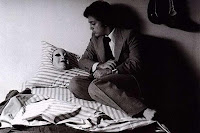(This is the first part of a planned series on the work
and legacy of psychoanalyst Otto Rank)
The founding father of psychoanalysis Sigmund Freud is
undeniably an important historical figure. His discovery of or rather focus on
the unconscious and its hidden processes brought a new understanding of human
psychology and behavior. It is akin to Galileo’s act of turning binoculars upward to gaze
at the sky, Darwin’s looking back into our common evolutionary past, or Einstein’s forward positioning of the relativity of time: it was a game-changer that
like any important and relevant insights not only need time to be fully
processed but also will find stubborn and persistent resistance along the way.
Yet often we tend to idolize the founders, and this leads
not only to very high if not impossible standards and expectations, but we
assume that they are infallible. Being a genius does not make you infallible
and even someone as "bullet-proof" as Einstein can, given time and space, demonstrate occasional
blunders. This does not make them wrong but only reminds us that they are human
and hence fallible and not perfect.
In Freud’s case, we may also add a relatively big ego, which
confounds things a bit more. But he certainly did not lack in ambition. For his brand and branch of psychology to succeed, he tried to legitimize it by
putting it on or "raising" it to the field of science. This is yet a seemingly
impossible if not misguided task not because of his views being wrong (for the
most part, he is spot on) but rather because science is lagging in this respect. The scientific
conception is by choice and design limited as it is too narrowly focused on
logic and rationality, which makes the job of psychology much more cumbersome as
human beings tend to be irrational and not rational beings as they are driven predominantly
by unconscious motives, desires, and processes.
Enter Otto Rank who attempts to bring in a fresh and soulful perspective to psychoanalysis and psychology as a whole. In fact, the word psyche
refers to that concept and reality precisely. At the inception of
psychoanalysis, Jung tried a similar feat that led to major disagreements
between him and Freud. The problem with Jung was that he might have ventured a
bit too far into the spiritual and the occult and that did not please Herr
Freud much, especially considering his preoccupation with being accepted and
embraced (in other words legitimized) by science. This alongside other factors,
perhaps Jung’s free sexual entanglements with some of his female patients
(including the influential and to this day underrated Russian psychoanalyst
Sabina Spielrein), led to their ideological rupture.
Since Jung started to disappoint him with what was seen or interpreted as extreme
or radical, Freud had his eyes set on Otto Rank, Freud’s promising secretary, and considered him his potential successor. But this turned out to be a classic case or a textbook example of the student exceeding the master. Rank was a fan of Freud, but he was also very ambitious and
fortunately, Alfred Adler noticed this passion and fire within the young Rank
and introduced him to the great Freud. Seeing great potential in him, Freud
took Rank under his wing making him his secretary, a duty that the latter
performed diligently and dutifully for various years.
Yet Rank noticed that while Jung was admittedly giving too
much weight and ponderance to the spiritual realm, Freud had done the same when
it came to the issue of sexuality. Through Freud, psychoanalysis started off on
a mechanical and deterministic note and was too much guided by biology, again
the attempt to embed and tie and ground it closely and firmly within the field of science.
Marx would try a similar feat by trying to see human behavior and existence
predominantly through the lens of economic struggles and necessities to build
his own version of political science.
Rank saw that all these perspectives lacked soul or
life’s essence. Humanity was not driven and run merely by sexual or economic
instincts but there was a quest for immortality that was embedded into our
genetic code and psyche from the moment we came to life and breathed our first
breath. For instance, birth itself creates unspeakable (pre-verbal and not able to communicate) trauma that becomes
deeply woven into our existence from the get-go. Each of us leaves the warmth of
the womb to be suddenly, unexpectedly, and inexplicably thrust into the world and exposed to lights,
sounds, and scents that are truly overwhelming to human psychology.
This trauma becomes so much part of human nature that we
find ourselves in a fetal position in moments of extreme distress, and we often tend to lose our breath when faced with fear, the same way, we entered the world out of breath until we
announced and marked our entrance with a piercing long-lasting cry of despair. And with our
birth, the looming shadow of death will haunt and follow us for the rest of our days until
death separates us from life as we know it. These two often unspoken,
unacknowledged, and unprocessed traumas are essentially the root of many of our
irrational acts and behaviors. Then, there are other traumatic experiences that
add to it to make the human condition even worse than it already is.
It is Damocles’ sword dangling above our heads, and while he
was consciously aware of it, we try to push it deeper into our unconscious
preferring not to deal with it. And yet, it leads us to both beneficial and
harmful acts to ensure ourselves of our existence beyond our ordinary and limited lives.
Religion was created not merely because of an infantile wish to have a father
figure protect and guide us but also due to a need for our existence to continue after
our lives.
In a similar vein, culture ensures the confirmation and
continuation of our specific rituals and traditions into the beyond. The same
thought process could be applied to the creation of states and nations so that
we can ensure our unique differences stand out from the others. By
doing so, we preserve our identity and see our heritage pass on to subsequent lives even if we may or may not exist afterward.
In either case and at any rate, death is the motivating factor and the Ursprung, inception, and foundation of our fears and
actions. Once we notice this and bring it into our consciousness, we can better
understand and shed light upon our (seemingly) irrational actions and
behaviors. This switch from Freud's insistence on sexuality, which is no doubt a necessary and vital
part of our existence to the focus on death, our looming and potential non-existence, can
lead to not only a better explanation and understanding of ourselves but also a better
management of our underlying existential fear and dread.
Why is it that we relish in bad news, that we are glued to
the screen watching footage from the latest natural disaster, the mass shooting, or even going close to a scene of an accident to get a better glimpse of its
repercussions and bloody aftermath? Some may see it as a form of morbidity, our often denied
and neglected obsession with the dark side, and this is certainly partially
true, but it comes also with an unspoken element of relief if not glee as we
reflect that thank goodness it was them, and not us and that we find ourselves
unharmed and alive in the safety of our home or our vehicle.
This can also explain the "drive" to kill others, whether
physically or symbolically, as it ensures our own survival and the survival of
our kind, be it family, nation, or political affiliation. On the other hand, we
see their attacks as trying to uproot us and steal our existence and
immortality from us. These ideological narratives that guide us both on a
conscious but even more so on an unconscious level can lead some people to a willingness to sacrifice their lives for a cause or a motive deemed important.
From this perspective, we may lay down our lives to protect
our nation in a war, we may sacrifice ourselves to protect our family, or we
may die for an ideology, whether it is a Buddhist monk immolating himself as a
form of protest, a soldier dying in a war, or suicidal bombers killing
themselves in a terrorist act. These are of course different contexts with
different moralities and justifications, but in essence, they are driven by our
fear of death and non-existence with the willingness to die in order to live on
in one form or another.
This has its roots in the totem in which the existence of
the clan or tribe was superseded by any personal worries, concerns, or
preoccupations. At this point, the given individuals give less importance to
their own personal safety and survival but rather the collective survival and well-being of their people
by adding to the already existing chain built of, from, and by their ancestors continuing the lifeline and accomplishments of their predecessors.
To sacrifice one’s needs and at times existence for the
common good are often emblematic themes of totalitarian regimes and ideologies,
be it fascism or communism. As Rank himself puts it, “both fascism and
communism are the results of unfulfilled promises of democracy”. Interestingly,
while communism forces people to be and become equal, fascism has its sights on
forcing freedom onto people and both are two faces of the same impossible coin.
As a matter of fact, whether they accept it or not, they all have their ties
with religion and even culture cannot be spelled without the word cult, an
agreement based on conformity and universality of old “spiritual life values”,
which is generally intolerant towards difference as it attempts to express the
irrational and immortal in its own seemingly rational terms.
This maintenance of traditions and values is to be
presented as a form of preserving one’s nation or the common good, but it may
often have dangerous unperceived repercussions for us and our surroundings. This
rather common (both in terms of prevalent and simplistic) morality builds upon
the segregation of an Us versus Them mentality (essentially an extension of the
“I” and “not-I” way of perceiving the world) fueled by a misguided and dangerous
form of black-and-white thinking. To be “good” is less a moral question or
issue but would simply mean to be bigger than oneself, with this
extension, to reach if not individual then collective immortality.
This type and genre of absolutist thinking has been the underlying
driving force of various misdeeds and evil actions throughout history and continues
to be perpetuated to this day while at the same time underscoring humankind’s
eternal conflict between a need for likeness (conformity) and a desire for
difference (individuality, i.e., rebellion). Yet the given group, be it a
family, a tribe, a culture, a religion, a nation, or a political party needs to
carve itself out and distance itself from others hence the indifference and
intolerance towards others in terms of appearance, thoughts, lifestyles, and
behaviors.
I believe that Rank’s focus on birth and death as the
starting and end point of life on this planet filled with an individual life in between provides a much more complete picture and explanation of human
psychology and how and why it can go so awry at times. The injection of the
soul into psychology incorporates the desire for immortality and has its roots
in the beginning of culture and traditions.
It seems that Rank did not personally believe in a soul per
se and much less in a divinity, but he understood the necessity for wanting to
do so. More than many others, especially of his own times, he noted the
irrational forces at work and the incapacity for therapy to fully reach and
address them in a constructive and healing manner. The aim of therapy should
not be the adjustment to the social environment, which may be incomplete or
questionable at different times, but the strengthening of the individual will.
Rank’s views on the chosen and more empathic mode and manner of
therapy, which was also at odds with Freud’s more clinical and almost sterile
approach, have had influences throughout the field of psychoanalysis,
psychology, and psychotherapy. Combined, his influence and legacy are
undeniable but unfortunately even up to this day, Rank has not received the
credit and recognition he should have had, and he would have deserved.
In fact, the opposite has been true as he was maligned,
demonized, and excommunicated from the psychoanalytic circles because he dared
to object to and disagree with the reigning master of the times, his teacher Freud. And yet, that
is what has made Otto Rank not only highly influential but immortal in many forms
and aspects to this day - and beyond.
(If interested in knowing more about this revolutionary and visionary psychoanalyst and thinker, I recommend you check out my podcast as well as the upcoming Online International Conference “Unleashing Otto Rank: The Creation of Modern Depth Therapy” on November 4th and November 5th, 2023!)










